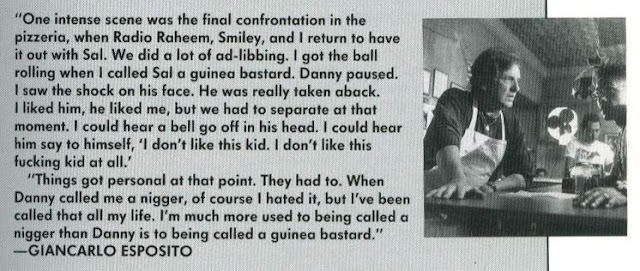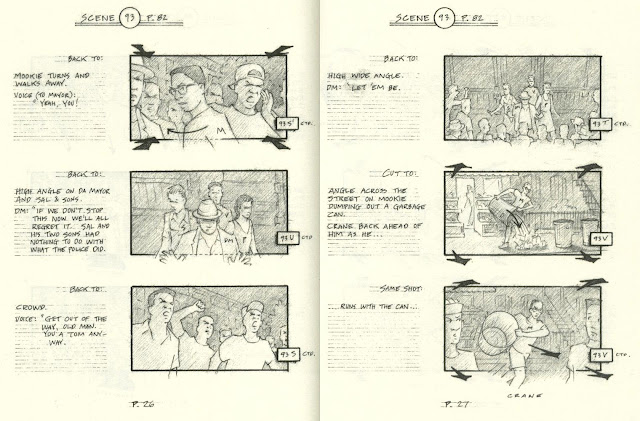(Previously on AFOS: The Blog: Parts 1, 2 and 3. The following is from August 25, 2009.)
After posting a bunch of interesting Batman concept drawings and set photos from the 20-year-old blockbuster's official movie souvenir magazine, I'm doing the same thing with a similar tie-in for summer 1989's other landmark film, Do the Right Thing. But instead of an official movie mag, the Spike Lee Joint spawned a now-out-of-print Fireside/Simon & Schuster companion book that Lee wrote with the assistance of ex-girlfriend Lisa Jones. The director has done several companion books for his films. Each of these books contain behind-the-scenes photos, the film's script and Lee's own production journal (some of the Do the Right Thing journal passages are like tweets with better spelling: "Haven't written in a couple of days. I've been busy trying to save School Daze from being dogged.").
I've discussed before why Do the Right Thing is one of my favorite films and why writers of color like myself cite it as an influence. One aspect of the film that I don't think gets enough props is the terrific production design by Wynn Thomas, who drew this sketch of the We Love Radio and Sal's Famous Pizzeria set exteriors. Using an old Coney Island pizzeria as the basis for Sal's, the film's crew built it from scratch on an empty Bed-Stuy lot. "The ultimate compliment was when real people would walk off the street and try and buy a slice," said Thomas in an L.A. Times oral history about the movie. Thomas later created nifty-looking sets for Mars Attacks! and brought CONTROL Headquarters into the 21st century for Steve Carell's Get Smart.

Clockwise: The sets that are listed on this Do the Right Thing ground plan are the neighborhood church; generator storage; the home belonging to John Savage's gentrifying yuppie character; Da Mayor's home; the Puerto Rican stoop; We Love; Sal's; the street corner inhabited by the trash-talking Greek chorus of ML (Paul Benjamin), Coconut Sid (Frankie Faison) and Sweet Dick Willie (the late stand-up comic Robin Harris); the Korean market; Mother Sister's home; and Jade and Mookie's apartment. I like how the "Corner Men" are included on the ground plan. In the journal's February 21, 1988 entry, Lee wrote that he wanted to give Harris a part in which he could ad-lib ("I wouldn't dare to write his dialogue"), and a corner man character would be perfect for him. It sure was.
Rosie Perez, who at the time was a Soul Train dancer who was making her big-screen debut in Do the Right Thing and was a reason why its main titles are one of the illest openers in a film ever, sits with the child actor who played her character's son and his triplet brothers.
I'm posting this pic of Steve Park as Sonny the irritable Korean grocer simply because pics of Park or his Do the Right Thing character never turn up in Google image searches. Park will always be cool in my book for putting the Friends crew members on blast in 1997 because of a staffer's racist treatment of James Hong when both actors guest-starred on the sitcom. Lo Pan should have fried that douchenozzle's ass with his laser beam eyes.
Several of the most fascinating quotes in the companion book's photo gallery came from Giancarlo Esposito, who played wannabe activist Buggin' Out.
According to Lee, "At the last moment, Paramount asked me to change the ending. They wanted Mookie and Sal to hug and be friends and sing 'We Are the World.' They told me this on a Friday; Monday morning we were at Universal."
The Do the Right Thing crew, which shot the film from July to September 1988 and helped start diversifying New York film crews by employing mostly black crew members, poses in front of the We Love set.
Heat storyboard artist and Danny Deckchair director Jeff Balsmeyer drew these boards for the harrowing scene in which cops murder Radio Raheem. "If in a review, a critic discussed how Sal's Famous was burned down but didn't mention anything about Radio Raheem getting killed, it seemed obvious that he or she valued white-owned property more than the life of this young black hoodlum," said Lee to the L.A. Times. "To me, loss of life outweighs loss of property. You can rebuild a building. I mean, they're rebuilding New Orleans now but the people that died there are never coming back."
In Living Color once poked fun at Lee's "skinny legs and big feet." In Balsmeyer's storyboards for the Trash Can Toss Heard 'Round the World, Mookie looks like he's been hitting the NordicTrack.












No comments:
Post a Comment